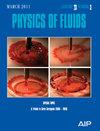The topology-conditioned turbulence kinetic energy budget
IF 4.1
2区 工程技术
Q1 MECHANICS
引用次数: 0
Abstract
The paper reports on the conditionally averaged turbulence kinetic energy (TKE) budget, where the conditioning is based on the invariants of the velocity gradient tensor. Three different datasets are utilized for this analysis. The particular terms of the budget are presented in the (R, Q) plane, showcasing a striking similarity (both quantitative and qualitative) among the results from each dataset. The importance of conditional averages for the overall variance of the specific terms of the TKE budget is also evaluated. Subsequently, the budgets are presented along conditional mean trajectories (CMTs), revealing the dynamics of the TKE budget associated with the evolution of local flow topology. Results obtained for different CMTs approximately collapse when suitably normalized (at least for certain parts of the trajectories). The conditional budget is clearly dominated by inertial and pressure transport terms, indicative of a “sweeping” effect.拓扑条件下的湍流动能预算
本文报告了条件平均湍流动能(TKE)预算,其中条件是基于速度梯度张量的不变量。分析中使用了三个不同的数据集。预算的特定项显示在(R,Q)平面上,展示了每个数据集结果之间惊人的相似性(包括定量和定性)。此外,还评估了条件平均值对 TKE 预算特定项总体方差的重要性。随后,沿着条件平均轨迹(CMT)展示了预算,揭示了与局部流拓扑演变相关的 TKE 预算动态。对不同的 CMT 进行适当的归一化处理后(至少在轨迹的某些部分),得到的结果近似折叠。条件预算明显由惯性和压力传输项主导,表明存在 "横扫 "效应。
本文章由计算机程序翻译,如有差异,请以英文原文为准。
求助全文
约1分钟内获得全文
求助全文
来源期刊

Physics of Fluids
物理-力学
CiteScore
6.50
自引率
41.30%
发文量
2063
审稿时长
2.6 months
期刊介绍:
Physics of Fluids (PoF) is a preeminent journal devoted to publishing original theoretical, computational, and experimental contributions to the understanding of the dynamics of gases, liquids, and complex or multiphase fluids. Topics published in PoF are diverse and reflect the most important subjects in fluid dynamics, including, but not limited to:
-Acoustics
-Aerospace and aeronautical flow
-Astrophysical flow
-Biofluid mechanics
-Cavitation and cavitating flows
-Combustion flows
-Complex fluids
-Compressible flow
-Computational fluid dynamics
-Contact lines
-Continuum mechanics
-Convection
-Cryogenic flow
-Droplets
-Electrical and magnetic effects in fluid flow
-Foam, bubble, and film mechanics
-Flow control
-Flow instability and transition
-Flow orientation and anisotropy
-Flows with other transport phenomena
-Flows with complex boundary conditions
-Flow visualization
-Fluid mechanics
-Fluid physical properties
-Fluid–structure interactions
-Free surface flows
-Geophysical flow
-Interfacial flow
-Knudsen flow
-Laminar flow
-Liquid crystals
-Mathematics of fluids
-Micro- and nanofluid mechanics
-Mixing
-Molecular theory
-Nanofluidics
-Particulate, multiphase, and granular flow
-Processing flows
-Relativistic fluid mechanics
-Rotating flows
-Shock wave phenomena
-Soft matter
-Stratified flows
-Supercritical fluids
-Superfluidity
-Thermodynamics of flow systems
-Transonic flow
-Turbulent flow
-Viscous and non-Newtonian flow
-Viscoelasticity
-Vortex dynamics
-Waves
 求助内容:
求助内容: 应助结果提醒方式:
应助结果提醒方式:


